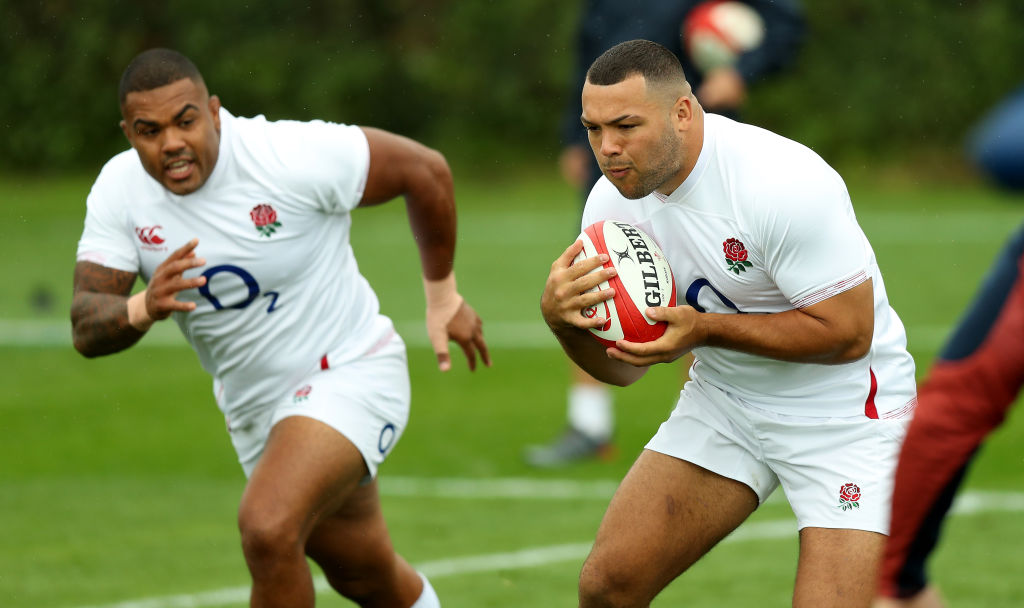Ugo Monye has a big battle to end elitist stigma of rugby | Jeff Probyn

BRISTOL, ENGLAND - AUGUST 16: Ellis Genge runs with the ball watched by Kyle Sinckler during the England captain's run held at Clifton College on August 16, 2019 in Bristol, England. (Photo by David Rogers/Getty Images)
Who would have believed it? Soccer looks to copy rugby as a group of elite clubs attempted to plough their own route and damn the rest.
The plan for the new Super League in soccer had many of the trade marks of the rugby Premiership, as what is perceived as an elite group of clubs with wealthy owners decided to set up their own competition outside of the control of the official associations for their own benefit.
The reaction of the various football associations was probably expected by the owners, but I doubt that the way supporters groups reacted to the potential damage to the rest of the league structure and the development pyramid would have crossed their minds.
The mass rejection of what was seen as a financial decision by those clubs in their hope of recouping some of the massive losses they have experienced because of the lockdown must have come as a shock, particularly the fans' support for the other clubs in the league structure – and it all forced a hurred rethink.
Sadly, the rugby community seem far less reactionary given that the ring-fenced Premiership has impacted on the entire league structure.
Many clubs and investors outside the Premiership are now considering if funding the development of players and facilities is worthwhile with no incentive to continue.
Bristol's director of rugby Pat Lam points to a lack of incentive for the Premiership clubs as well, unless league position is linked to funding, to make sure the Premiership season has value for clubs from the first to last game of the season.
As he says, “Once you get to a situation where there is nothing to play for it becomes devalued for players and fans.”
In other words, those at the bottom of the Premiership no longer have to battle to avoid relegation so results don't matter and they just carry on knowing their position in the top league is assured.
As for the development pyramid, that was destroyed years ago with the formation of Premiership-owned academies taking the development role from county rugby.
Young players have no route to the top of the game if they are not selected for a Premiership academy which can be directly influenced by the school they attend. Because many academies have direct links to public schools, there is a conflict of interests reducing the chance of the RFU using its vast numerical superiority to gain success.
The RFU has formed an independent diversity and inclusion advisory group.
Chaired by @ugomonye alongside @GiselleM18, it has been established to support the RFU with its goal of driving rugby union in England to reflect the diversity in society.
Find out more ⤵️
— England Rugby (@EnglandRugby) April 19, 2021
Ugo Monye, who is taking the reins of the new RFU diversity and inclusion advisory group, will have a lot of work on his hands in changing what is perceived as an elitist sport at the top of the game for the wealthy, to an open and inclusive sport for all.
“Young players have no route to the top if they are not selected for a Prem academy”
This group should be looking at all the areas of the game that show a bias against any sections of society (not just the usual headline groups) that are under-represented at any level but particularly the elite section of the sport, administration or playing.
Even though under half of state schools play rugby, they still generate the vast majority of players and administrators across the game and yet the numbers who make it to the professional game, let alone international, do not reflect that with around 61 per cent of Premiership players coming from public schools.
Not only will Monye's group have to look at the imbalance of privately-educated international players – at 31 per cent when only seven per cent of people attend private schools – but also how many young players are offered places in Premiership academies from state schools as opposed to the public schools.
Academy places are initially allocated at under 15 with a majority coming from schools' county rugby, which has had a bias against state schools – even if passive – since before the game went professional.
Many of the county selectors are teachers from public schools, so they are inclined to pick those they know, either from their own school or the teams they compete against, offering little hope for state school players.
With academies virtually the only route to a professional contract, is it any wonder that players from state schools are so under-represented at the top of the game?